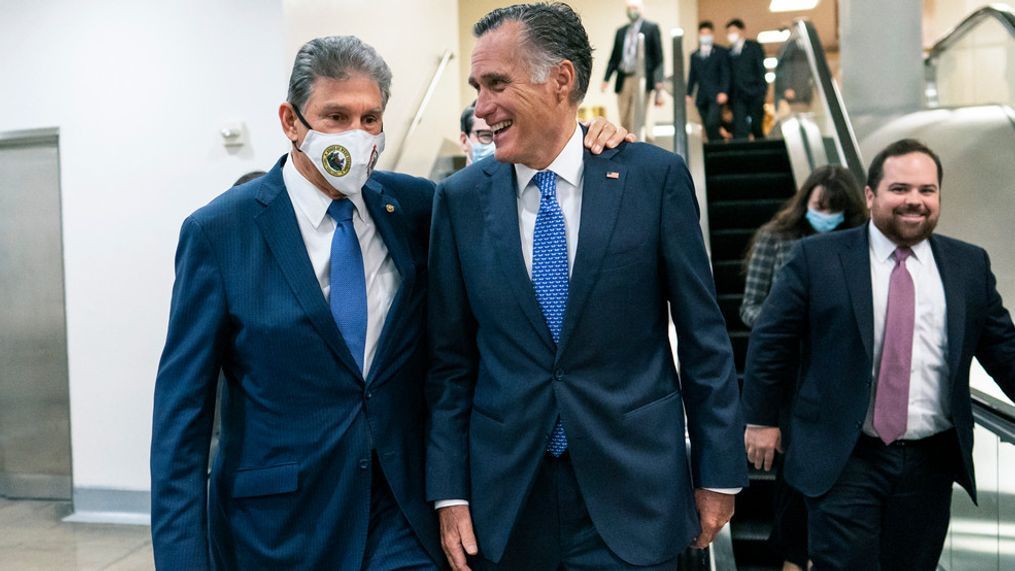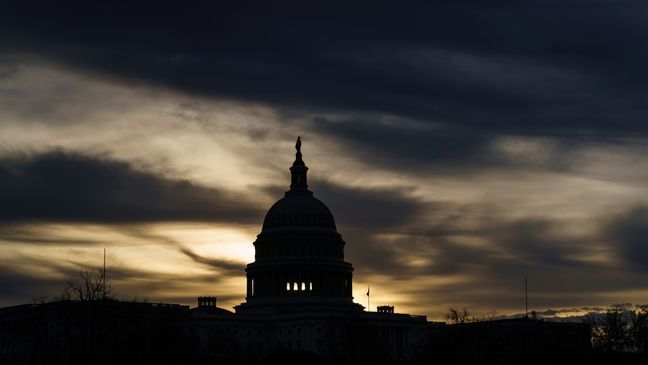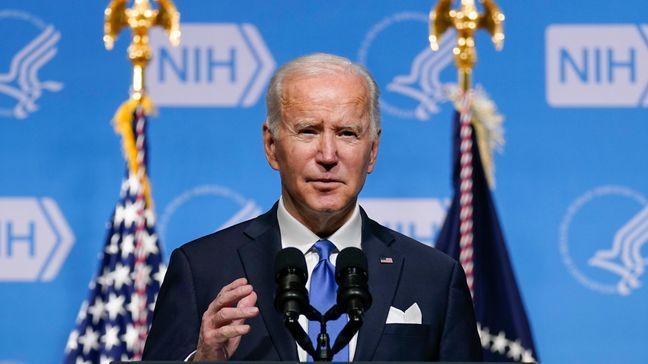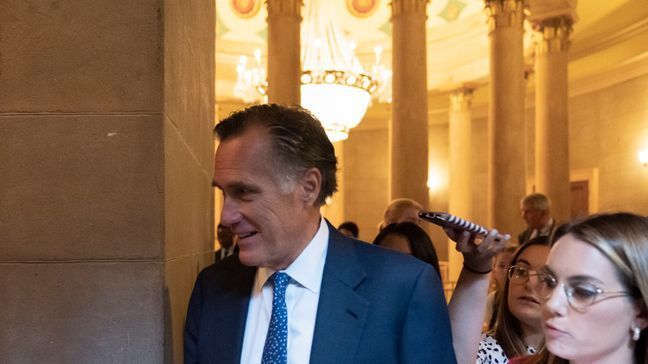Romney revives alternative proposal as Dems struggle to extend child credit
WASHINGTON (TND) — With the final monthly child tax credit payments authorized under the American Rescue Plan distributed and efforts to extend the benefit stalled, the White House and congressional Democrats are scrambling to avert a spike in child poverty in the months ahead.
Under the ARP, Democrats increased the child tax credit to $3,600 per year for children 5 and under and $3,000 for those 6 to 17, and they made it fully refundable, allowing families with little or no income to claim the full credit. The Internal Revenue Service began distributing monthly payments in July, but the bill only funded the enhanced credit for 2021.
“The lives of tens of millions of children across the country have improved because families have received tax relief when they need it most,” Treasury Secretary Janet Yellen said last week.
After the rejection of the Build Back Better Act by Sen. Joe Manchin, D-W.Va. – which would have made full refundability permanent but only extended the increased payments for one year – the Dec. 15 payments to nearly 40 million households could be the last. If the child credit reverts to the pre-ARP structure, advocates estimate 27 million children will receive reduced credits or none at all in 2022, and 10 million children could plunge back into poverty.
“The expanded child tax credit is a once-in-a-generation opportunity to invest in a better future for the next generation of America’s children,” said Natalie Foster, co-chair of Economic Security Project Action, calling the failure to extend the benefit “irresponsible and callous.”
Manchin has insisted he would be open to voting for a standalone extension of the credit, but the Democrat-backed version of the program has no Republican support. Enter Sen. Mitt Romney, R-Utah, who called for a new bipartisan approach Monday, despite deepening divides between the two parties.
“Now that it is clear ‘Build Back Better’ isn’t moving forward and with bipartisan opposition to extending the President’s ill-crafted Child Tax Credit, the Administration has an opportunity to do what it failed to do before—actually work with Republicans and Democrats on a lasting, fiscally-responsible CTC reform,” Romney said in a statement.
He pointed to the Family Security Act he introduced earlier this year, which would provide a $350 monthly payment to families for each child under 6 years old – starting four months before birth – and $250 a month from age 6 to 17. The payments would be distributed by the Social Security Administration and available to all children with a Social Security number, and they would phase out for households with higher incomes.
Romney’s plan also aimed to reform the Earned Income Tax Credit to eliminate marriage penalties and increase work incentives. He would fund the estimated $66 billion annual cost of the program by eliminating existing child and dependent care credits and the Temporary Assistance for Needy Families program, as well as changing food stamp eligibility and getting rid of the state and local tax deduction.
When Romney initially unveiled the proposal, he got a mixed reaction from Republicans, with some welcoming a conservative vision for a child allowance program and others alleging the payments would create a harmful disincentive to work. The White House called his pitch “encouraging,” and some progressives indicated openness to it.
Matt Bruenig of the People’s Policy Project argued Romney’s approach was superior to Biden’s, providing more total benefits and relying on the SSA over the IRS to ensure more families received payments. He also noted Tuesday that Romney’s payment structure essentially amounts to a more generous parental leave benefit than Democrats sought in the Build Back Better Act.
“Democrats should work with Romney to pass this plan,” Bruenig said. “Any quibbles they may have with the design should be fairly small and Romney has signaled some willingness to iron them out.”
Other Republicans have backed versions of an enhanced child credit or a child allowance in the past. However, the specifics of their proposals are typically far afield from what Democrats would prefer, such as work requirements or reforms that weaken existing social welfare programs.
Some centrist Democrats and progressives have raised concerns about the Democratic version of the child credit and the Build Back Better Act’s short-term extension, as well. Only funding it through 2022 could leave the program vulnerable if Republicans who have denounced the payments as socialism regain control of Congress in the midterms.
According to an Ipsos survey conducted last month, nearly 70% of families reported the monthly payments reduced their financial stress, and many said the money enabled them to pay for toys, gifts, and activities for their children. About one-quarter of respondents said the credit made it easier for them to engage in work or work more hours.
“We cut childhood poverty in this country almost in half. We cut hunger in this country in a quarter,” Sen. Michael Bennet, D-Colo., told MSNBC last week. “You would think the least we could do is figure out how to extend that until politicians can figure out how to reach a deal.”
The monthly payments have provided low-income families with assistance purchasing basic necessities and the credit has become a centerpiece of Biden’s economic agenda, but the overall public response has been mixed, at best. In a recent Morning Consult/Politico poll, only one-third of Americans backed making the expanded child tax credit permanent, and 38% said they opposed any extension.
As prospects for extending the existing credit dwindle, some on the left have opened the door to a plausible bipartisan compromise. Manchin’s conditions for a Democratic domestic spending bill – a maximum $1.8 trillion price tag and fully funding programs for 10 years – make including a permanent extension of the ARP child credit at an estimated cost of $1.6 trillion nearly impossible.
According to The Washington Post, a framework Manchin presented to the White House last week included universal prekindergarten, health care subsidies, and climate change initiatives, but it abandoned the child tax credit. Other reports indicate the senator objected to the structure of the payments and privately suggested families might misuse the money.
“Sen. Manchin has made clear he supports the child tax credit and believes the money should be targeted to those who need it most," a Manchin spokesperson told NBC News.
Romney and Sen. Bennet introduced a bipartisan plan to increase and expand the child tax credit in 2019, including making much of it fully refundable regardless of income. The proposal drew praise from some on the right and the left, and the Niskanen Center estimated it would lift 1.6 million children out of poverty at an annual cost of $24 billion.
The Utah Republican worked closely with Manchin on the bipartisan infrastructure bill signed by President Biden last month. Ironing out a similar compromise on a child allowance that could get 60 votes in the Senate might be more challenging, but proponents of the payments may be running out of time and alternative options.
“Legislation that impacts something as important as our children must be done on a bipartisan basis, and I urge my colleagues to come to the negotiating table to get something done for American families,” Romney said Monday.




